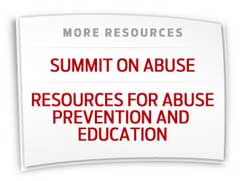
The idea that verbal, physical, sexual, emotional abuse doesn’t exist in congregations if the pastors or members are unaware of it is contrary to what we have learned from a series of studies among Seventh-day Adventists. Research shows that as many as 42 percent of our members have experienced some form of abuse during their lifetimes. In order of most frequent to least frequent, these abuses include intimidation and physical violence; sexual victimization; resource deprivation; leveraging of children; and potentially lethal actions. In addition, controlling and demeaning behavior was reported by 61 percent of members who responded to the surveys.1 This means that in every congregation there are likely members who have experienced, or are experiencing, some form of abuse.
Abuse is routinely underreported by victims because of the shame, fear, and guilt associated with it. Therefore, the attitude of denial on the part of church members and leaders is harmful because it prevents victims from getting the help they need. In order for the church to be a safe place, abuse must be acknowledged and understood. Victims must be heard, allegations must be investigated impartially, and no abuse should be excused or tolerated.
Since 2002 the fourth Sabbath in August has been designated Abuse Prevention Emphasis Day (APED) on the official world church calendar. However, many churches in the North American Division (NAD) have never heard of it. In the churches that are aware of APED, pastors or members often say that they don’t have to observe a day dedicated to abuse prevention because none of their members are abused.
Real People, Real Stories
The following four vignettes depict actual people and events in the Adventist Church. Their names and some details have been changed to protect victims’ privacy. After seven years of marriage, Sally’s husband, a church elder and successful soul winner, began to abuse her physically, sexually, and verbally. For five years she wondered what to do, feeling she was a hypocrite for keeping his terrible secret. She felt that it was wrong for him to be in a leadership position, but who would believe her? She begged him to get help, even promising to go to counseling with him; but he refused.
 Finally, in desperation she went to the pastor with the shameful truth about her husband. Instead of being concerned for her safety, the pastor informed her that it was her Christian duty to stay in the marriage and help her husband, since he was so important to the church. If she left him, the pastor warned, the people he had brought into the church might not stay. So, with a guilt trip instead of help and concern, Sally was sent home and instructed to pray for her husband and be the best wife she could be. One of the reasons abuse victims do not seek help from the church is advice such as Sally was given, which amounts to being revictimized. Jesus, our divine example, demonstrated how to treat people—with love, gentleness, and dignity. He healed broken hearts and broken lives. After all, it was He, the preincarnate Christ, who instructed His people, “Therefore you shall not oppress one another, but you shall fear your God; for I am the Lord your God” (Lev. 25:17).
Finally, in desperation she went to the pastor with the shameful truth about her husband. Instead of being concerned for her safety, the pastor informed her that it was her Christian duty to stay in the marriage and help her husband, since he was so important to the church. If she left him, the pastor warned, the people he had brought into the church might not stay. So, with a guilt trip instead of help and concern, Sally was sent home and instructed to pray for her husband and be the best wife she could be. One of the reasons abuse victims do not seek help from the church is advice such as Sally was given, which amounts to being revictimized. Jesus, our divine example, demonstrated how to treat people—with love, gentleness, and dignity. He healed broken hearts and broken lives. After all, it was He, the preincarnate Christ, who instructed His people, “Therefore you shall not oppress one another, but you shall fear your God; for I am the Lord your God” (Lev. 25:17).
When Julie was a junior in academy she was thrilled to be chosen to work for the principal, Mr. Haynes. She was a happy, outgoing student who excelled in school and was a spiritual leader on campus. However, late in the school year, for no apparent reason, Julie began to withdraw from her family and to lose interest in church. After college she stopped attending church altogether. She had difficulty with relationships and was not interested in keeping up with her former classmates or attending class reunions. Her parents were at a loss to explain the dramatic change in their daughter.
Then, 12 years after Julie left academy, several former students brought charges of sexual molestation against Mr. Haynes. Suddenly something clicked in the mind of Julie’s mother. She called Julie and asked, “Were you molested by Mr. Haynes?”
Julie’s response: “I don’t want to talk about it.” Her mother explained that it hadn’t been Julie’s fault and that she and her dad loved her and would do all they could to see that Mr. Haynes was brought to justice. Inexplicably, however, Julie remained detached and uncommunicative, unwilling to speak out about her abuse or get help for herself.
Julie’s story is not an isolated incident. Sexual abuse by authority figures destroys young lives by causing them to experience false guilt, lose trust in church leaders, experience difficulty in establishing and maintaining relationships, and develop bitterness toward God for not preventing it.
Tiffany lost her mother at age 13. As the oldest child in the family, she helped her father care for her younger siblings. In her grief she fell under the spell of a man in her church who “befriended” her. In a few months Tiffany became pregnant, and the man was sent to jail. What happened next defies explanation.
Church members rallied around the man’s wife and children, because, of course, they were in distress. In the minds of some church members Tiffany had lured a good man into sin. She and her family were ostracized and had to leave the church. Thus, the church failed to minister to the true victim. They seemed to misunderstand a basic principle of abuse: It is always the responsibility of the person in the position of power or authority, in this case the adult, to maintain appropriate boundaries.
Ryan was abused by his stepfather, Mark, from the time he was a toddler. For the least childish infraction of his “rules,” Mark beat Ryan, verbally abused him, and locked him in the basement or a closet. He told Ryan repeatedly that he was worthless and would wind up dead or in jail.
Mark was a leader in the small church in which he had grown up. Though Ryan’s mother told the pastor and other members what was going on at home and asked for intervention, they were unwilling to believe that someone who had grown up in their midst was not what he appeared to be.
 After several years of abuse Ryan’s mom divorced Mark, but Ryan’s emotional scars remained. He struggled with issues of trust and self-worth. He was angry at the church and at God for not protecting him from his stepfather. By the time he was a teenager Ryan turned to drugs to numb his pain. When he was 16, he was sent to a drug rehabilitation facility, where he finally received help. Even so, Ryan’s wounds were too deep and too long-standing to be healed in the few short months of rehab. Within a week after being released, Ryan died of a drug overdose. His stepfather’s abusive words had become a self-fulfilling prophecy.
After several years of abuse Ryan’s mom divorced Mark, but Ryan’s emotional scars remained. He struggled with issues of trust and self-worth. He was angry at the church and at God for not protecting him from his stepfather. By the time he was a teenager Ryan turned to drugs to numb his pain. When he was 16, he was sent to a drug rehabilitation facility, where he finally received help. Even so, Ryan’s wounds were too deep and too long-standing to be healed in the few short months of rehab. Within a week after being released, Ryan died of a drug overdose. His stepfather’s abusive words had become a self-fulfilling prophecy.
What is a congregation’s responsibility when a member reports abuse of any kind? Is it to mind our own business and not get involved in someone else’s problems? Is it to deny that the alleged abuser could possibly do the things he or she is accused of? Or does God expect something more of us?
After Ryan’s death a family member expressed her grief this way: “I find myself with two conflicting emotions: On one side is sorrow for the loss of Ryan, the pain he suffered, and the fact that the church wasn’t ‘there’ for him and his family. On the other side is my love for the church and the certainty that we can rise up to be what God has called us to be—a place of help and healing.”
The Problem With Abuse
Abuse is defined as intentionally or unconsciously injuring or damaging someone physically, psychologically/ emotionally, or sexually for the purpose of intimidating, dominating, or controlling that person. Abuse is wrong for the following reasons:
? Abuse deprives children of their innocence. Sexual abuse, in particular, destroys the ability of children and teens to trust and to relate to others in appropriate ways. It leaves scars that last a lifetime. Likewise, verbal, physical, and emotional abuse robs children of the joy and innocence that should characterize childhood. Jesus’ words vividly illustrate how precious children are to Him: “Whoever causes one of these little ones who believe in Me to sin, it would be better for him if a millstone were hung around his neck, and he were drowned in the depth of the sea” (Matt. 18:6).
? Abuse robs individuals of their self-esteem, which is essential for correctly relating to God and to others. Healthy self-esteem is based on the knowledge that Someone loved each of us, individually, enough to die for us. Without that abiding awareness, making healthy life choices is infinitely more difficult. Even though verbal abuse leaves no physical scars, it is as harmful to selfesteem as other kinds of abuse. The apostle Paul observed that our speech should be “helpful for building others up”(Eph. 4:29, NIV).
? Abuse is not part of God’s plan for families. As a church, we have long been blessed with guidance for building healthy families, much of which is distilled in the book The Adventist Home. On the very first page of Chapter One, Ellen White wrote that home “should be a little heaven upon earth, a place where the affections are cultivated instead of being studiously repressed.”2 This heavenly atmosphere must be intentionally fostered by godly love and actions on the part of parents, in partnership with the Holy Spirit—never by force or abuse.
? Perhaps the most compelling reason that we should be concerned about abuse is that it distorts the victim’s perception of God and, by extension, the church. Victims often find it virtually impossible to conceive of a loving God, one who loves them unconditionally. They reason that if He loved them, He would have protected them from the abuse. They leave the church when their cries for help are ignored and when they are abused by members. The reality is that the way we as a corporate body respond to abuse in the church can have eternal consequences.
The Church Responds
The Adventist Church recognizes that abuse is a serious issue among its members, which is why the Annual Council of the General Conference voted in 2001 to set aside a day each year for the observance of Abuse Prevention Emphasis Day (APED) in every church around the world.
 The Abuse Prevention Emphasis Day Committee, with representatives from Adventist Chaplaincy Ministries, Adventist Review, Children’s Ministries, Education Department, Family Ministries, Health Ministries, Ministerial Association, Women’s Ministries, and Youth Ministries, was charged with the task of producing resources every year to aid local churches in observing the day. Each year a new collection of resources that includes a sermon with PowerPoint illustrations, a children’s story, and material for Friday night and Sabbath afternoon programs is produced. In the North American Division the resource kit for APED is available in English, Spanish, and French, and can be downloaded from the Web sites of most ministries departments (see sidebar).
The Abuse Prevention Emphasis Day Committee, with representatives from Adventist Chaplaincy Ministries, Adventist Review, Children’s Ministries, Education Department, Family Ministries, Health Ministries, Ministerial Association, Women’s Ministries, and Youth Ministries, was charged with the task of producing resources every year to aid local churches in observing the day. Each year a new collection of resources that includes a sermon with PowerPoint illustrations, a children’s story, and material for Friday night and Sabbath afternoon programs is produced. In the North American Division the resource kit for APED is available in English, Spanish, and French, and can be downloaded from the Web sites of most ministries departments (see sidebar).
The 2011 theme is “Loved and Empowered” and augments the ongoing “Enditnow: Adventists Say No to Violence Against Women” campaign by ADRA and the Women’s Ministries Department. This year’s resource kit was written by Mable Dunbar, president of the Women’s Healing and Empowerment Network, which operates three healing centers for women in the Spokane, Washington, area. Dunbar was formerly women’s ministries and family ministries director of the Upper Columbia Conference.
Even though the fourth Sabbath in August each year has been designated as the day for APED observance, this date sometimes does not work in every church in the NAD. Therefore, each church should find a date that works best for them. The most important thing is that APED be observed sometime during each year in all our churches.
Anglo-Irish statesman Edmund Burke has been credited with saying, “All it takes for evil to triumph is for good men to do nothing.” Likewise, all it takes for the evil of abuse to exist—and thrive—in the church is for “good” church members to do nothing. As Christ’s emissaries on earth, the mission of the church is the same as that of Jesus, who declared, “He has sent Me to heal the brokenhearted, to proclaim liberty to the captives . . . , to set at liberty those who are oppressed” (Luke 4:18).
Every church does need to observe Abuse Prevention Emphasis Day each year to educate pastors and members about the realities of abuse, how to minister to victims, how to deal with abusers, and how to prevent it. If God is impressing you that your church should be educated about this evil that is too often ignored, why not talk with your pastor or church board about observing it in your church this year?
1 R. Drumm, with M. Popescu, G. Hopkins, and L. Spady, “Abuse in the Adventist Church?” Adventist Review, Oct. 11, 2007; www.adventistreview.org/article.php?d=1401.
2 Ellen G. White, The Adventist Home, p. 15.
3 Ellen G. White, Education, p. 17.
______________
Carla Baker is women's ministries director for the North American Division. This article first appeared in the August North American Division issue of Adventist World.